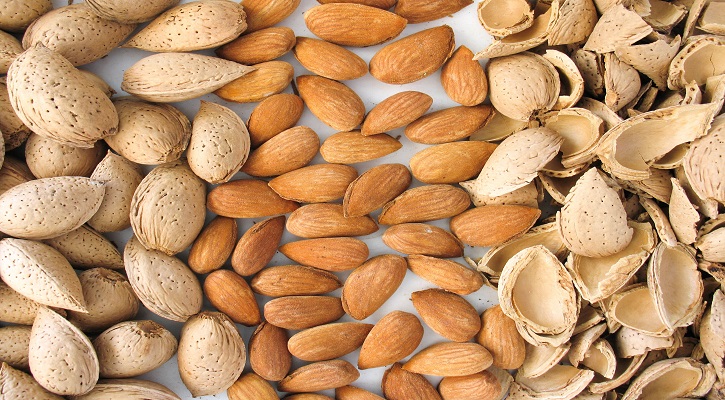
How Do Almonds Benefit Your Health?
- Womenscorner Desk
- September 10, 2020
Almonds are treasure chests of nutrients like vitamin E, zinc, potassium, and fatty acids. They can boost your memory, maintain good vision, improve digestion, and keep you full for a long time.
Powerhouses Of Nutrients : Almonds can be a great snack. They are nutrient-rich, low carb, and high-energy seeds that do not compromise on pleasing your palate. They are popular for their health benefits due to their nutrient composition. Almonds are rich in nutrients like mono-unsaturated fatty acids (MUFAs), poly-unsaturated fatty acids (PUFAs), and dietary fibers. They are also reserves of minerals and vitamins. These include calcium, potassium, magnesium, phosphorus, copper, iron, zinc, manganese, thiamine, vitamin B, vitamin E, and several phytonutrients. Almonds boast an impressive nutritive profile. 1 oz (28 g) of almonds contains 14 g of fat, 6 g of protein, and 164 calories.The way almonds are consumed determines their measured metabolizable energy (ME). Metabolizable energy is the net energy remaining after fecal and urine loss. In other words, ME represents the energy available for vital processes like growth, reproduction, work (locomotion), and respiration.
Read More : Almonds
May Soothe, Tone, And Rejuvenate Your Skin : Almonds are rich in oils and vitamin E. These unsaturated fats and polyphenols work as excellent skin conditioners. This
is why ancient schools of medicine used almond oil to treat dry skin issues. Almond oil can be used to treat dry skin conditions, such as psoriasis and eczema. It may also help improve your skin tone and complexion. Further studies are needed to determine its efficacy in treating post-operative scarring. These seeds are natural sources of ⍺-tocopherol, which, along with 7 other members, is known as vitamin E. Tocopherols are photoprotectants. They prevent skin damage caused due to exposure to sunlight and UV rays. Almonds are especially known for their antioxidants. Almond polyphenols especially flavonoids are amazing free radical scavengers. They also have an anti-inflammatory effect on your skin. In short, almonds in your diet or almond oil can treat dry skin, scars, wrinkles, pigmentation, and photodamage.
Read More : How to achieve your relationship goals ?
May Stimulate Hair Growth : Hair loss is a growing problem among contemporary women and men. Blame the modern diet, lifestyle, pollution, hormonal imbalance, malnutrition, and even overnutrition for it. A variety of therapies can help you cope with this problem. Oil massage is a classic option. Almond oil massage is one of the safest remedies for hair growth. It takes time to get absorbed into your scalp, but the vitamin E in it may condition your hair. Studies show that vitamin E supplementation may also increase hair numbers in people experiencing hair loss.
More importantly, deficiency of micronutrients can manifest as hair fall. Biotin deficiency is rare but results in thinning hair. It may cause hair fall, rashes, brittle nails, and exoskeleton issues. Roasted almonds are said to be good sources of biotin (¼ cup has about 1.5 mcg of biotin). Hence, adding almonds to your diet and massaging its oil onto your hair and scalp may stimulate healthy hair growth.
Read More : What is Appreciation Deficit Disorder?
May Boost Memory, Brain Health, And Cognition : Tree nuts like almonds are natural sources of tocopherol, folate, mono and polyunsaturated fatty acids, and polyphenols. These nutrients may prevent or delay the onset of age-related cognitive disorders and amnesia. Rat studies have shown that almonds, when given for 28 days, significantly improved memory retention. Almond phytochemicals also control cholesterol levels. This ensures no oxidized plaques block the neurons. The acetylcholine in almonds was proposed to be the active compound here. This shows the nootropic properties of almonds.
Diets that contain almonds are said to be extremely healthy. For instance, the Mediterranean diet that includes olives, almonds, and other nuts, tomatoes, spinach,
garlic, asparagus, and chickpeas can promote overall brain health. This is all thanks to the unsaturated fats they offer.
Read More : Zuii Organic
May Aid Weight Loss : Almonds induce a sense of satiety when you snack on them. They are nutrient-dense. This prevents hedonic hunger snacking and overeating, ultimately preventing weight gain. The unsaturated fats in almonds lower cholesterol. Almonds are also great sources of dietary fiber (1 oz. contains 3.5 g of fiber, 2.4g of insoluble fiber). High-fiber foods take time to digest, thus making you feel full for longer. You may still go ahead and add 1440 kJ equivalent serving of almonds with a limited risk of weight gain.
Can Boost Good Cholesterol (HDL) Levels : Consuming tree nuts like almonds have been shown to reduce bad cholesterol (LDL). Almonds are good sources of monounsaturated fats and polyunsaturated fats that regulate the LDL levels in individuals with diabetes and high cholesterol as well as their healthy counterparts. Eating almonds as part of your regular diet can help raise the good (HDL) cholesterol in circulation. Substituting high-carb snacks with almonds (about 43g/day) is a good way to start. Having a higher HDL than LDL level in circulation benefits several organ systems primarily, your heart.
Read More : Why Setting Relationship Goals Can Be a Good?
May Offer And Aid Cardiovascular Protection : Tree nuts, like almonds, contain high fiber, unsaturated fat, and phytochemicals. This profile is known to bring down the risk of cardiovascular diseases (CVD). This has been proven recently by studying the Mediterranean diet. A Mediterranean diet supplemented with 30 g/day tree nuts (almonds, hazelnuts, and walnuts) was shown to decrease the risk of cardiovascular events by 28 %. Almonds contain nutrients such as folic acid, L-arginine, vitamin E, and vitamin B. These nutrients can modulate the vascular function (vasodilatory property) of the circulatory system. These seeds can also tone down inflammation and oxidative stress in your body. Therefore, almonds can protect you from coronary heart disease (CAD), atherosclerosis, and high blood pressure (hypertension).
May Improve Glycemic Control And Diabetes : Studies have demonstrated that almonds can decrease the after-meal escalation in blood sugar. They assist in stabilizing blood sugar levels in people with diabetes. Eating about 60 g/day of almonds increases the intake of dietary fiber, magnesium, polyunsaturated fatty acids, monounsaturated fatty acids, and vitamin E. Most of these phytonutrients have antioxidant properties that reduce the risk of oxidative damage to proteins.
Almonds control your blood sugar levels, boost HDL levels, trap the circulating LDL molecules, combat oxidative stress, and induce satiety. These properties also reduce the risk of cardiovascular diseases in individuals with type 2 diabetes.
Read More : Symptoms of Appreciation Deficit Disorder
May Induce Satiety, Boost Energy And Improve Gastric Environment : Almonds have a tough texture. They can be hard to break down. In fact, a significant proportion of raw almond tissue is preserved intact even after chewing, digestion, and large bowel fermentation. But, chewing (masticating) them constantly releases more lipids and more energy. Another bonus of eating almonds is that it gives you a sense of fullness (satiety) because of their slow disintegration rate. Roasting almonds increases their disintegration rate. They also get digested quicker than raw ones. Snacking on a few almonds post-lunch can deal with the post-lunch dip in alertness, memory, and focus. They pump your energy levels. One ounce of almonds gives about 164 kcal (kilocalories), pistachios give 159 kcal, and peanuts give 161 kcal of energy. Choose your mid-day nibbles wisely!
Source : Google





